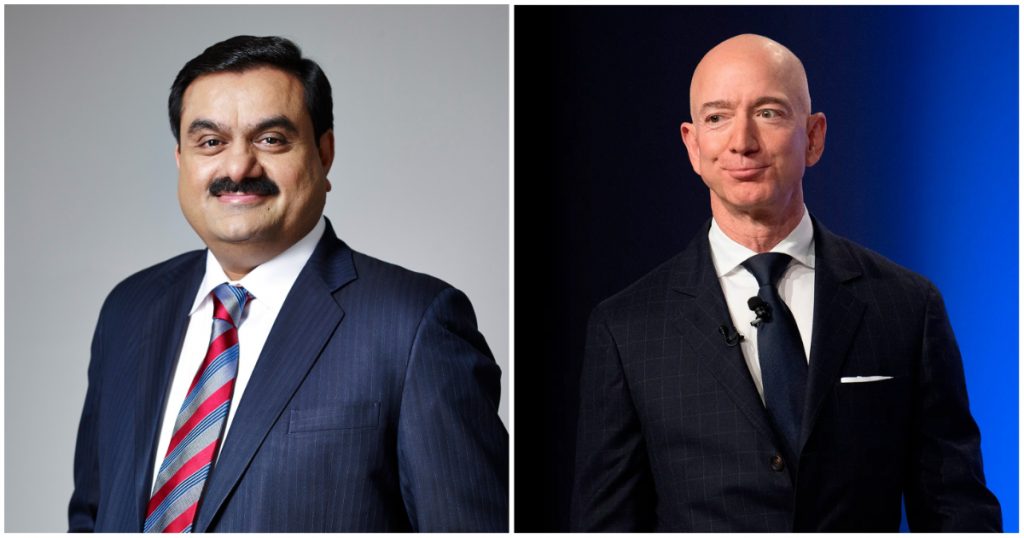An Indian is one position away from becoming the richest human being on the planet.
Gautam Adani has gone past Amazon founder Jeff Bezos to become the second richest man in the world. As per Forbes’ real-time billionaires list, Adani is currently worth $155.7 billion, putting him slightly ahead of France’s Bernard Arnault, whose wealth is $155.2 billion. Jeff Bezos has fallen to 4th place after a fall in Amazon’s stock over the last few days, and is worth $149 billion. Adani has become the first man ever from Asia to become the second richest man in the world. At the moment, he’s only behind Elon Musk, who continues to be the richest man on the planet with a net worth of $273 billion.

Both Elon Musk had Gautam Adani have had an extraordinary couple of years. At the end of 2019, neither of the two men were in the list of the 50 richest people in the world — Elon Musk was ranked 54, while Gautam Adani was ranked 68. Tesla’s stock, though, zoomed at the beginning of the pandemic, rising nearly five times and making Musk the richest man in the world. Adani’s stocks spiked a little later, spiking towards the beginning of 2021, and have now placed him in second position.
Adani Group stocks have been on a tear in recent months. Three Adani Group companies have delivered multi-bagger returns so far in 2022 — Adani Wilmar has doubled from its issue price, whereas Adani Power has zoomed 170 per cent. Adani Green Energy has also gained 80 per cent. Other companies from his group are up by 17-55 per cent in the current year. Adani’s net worth has risen from $50.5 billion in 2021 to $155 billion now.
But Adani hasn’t just had a couple of extraordinary years — his life-story is stuff of what entrepreneurial dreams are made of. Gautam Adani was born in 1962 in a Jain family in Ahmedabad, Gujarat. His father, Shantilal Adani, was a small textile merchant, and Gautam had seven other siblings. While he was a teenager, he had moved to Mumbai to work as a diamond sorter for Mahendra Brothers. He’d then followed a path that’s familiar to many global billionaires, including Bill Gates and Mark Zuckerberg — he had dropped out of college. Adani had enrolled for a Bachelor’s degree in Commerce at Gujarat University, but left after his second year to work on a business venture.
When Adani was 19, his elder brother Mahasukhbhai Adani bought a plastics unit in Ahmedabad, and invited him to manage the operations. This venture turned out to be Adani’s gateway to global trading through polyvinyl chloride (PVC) imports. In 1985, he started importing primary polymers for small-scale industries. In 1988, Adani established Adani Exports, now known as Adani Enterprises – the holding company of the Adani Group. Originally, the company dealt in agricultural and power commodities.
As India opened up its economy in 1991, the opportunities for Adani grew. In 1994, the Government of Gujarat announced managerial outsourcing of the Mundra Port and in 1995, Adani got the contract. In 1996, the power business arm of the Adani Group, Adani Power, was founded. Adani also manages the Mumbai airport, which is the second-largest in India in terms of annual passengers.
Adani’s companies are now massive behemoths. Mundra Port is the largest private sector port in India, with the capacity of handling close to 210 million tons of cargo per annum. Adani Power holds thermal power plants with a capacity of 4620MW, which is the largest private thermal power producer of the country. In May 2020, Adani also won the world’s largest solar bid by the Solar Energy Corporation of India (SECI), which was worth US$6 billion.
Adani has now become the first man in Asia to be counted amongst the top two richest people in the world. It’s a momentous achievement, and made even more impressive by the fact that Adani is a first generation entrepreneur from a relatively poor country. It remains to be seen how the Adani Group fares over the next few years, but his entry into the global top two signals a shift in global power — with a first-generation entrepreneur from India managing to break through the worldwide rich lists, he could pave the way for many more Asians generate tremendous wealth, both for themselves and their respective countries, in the decades to come.